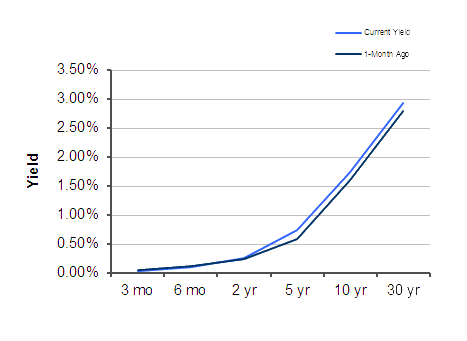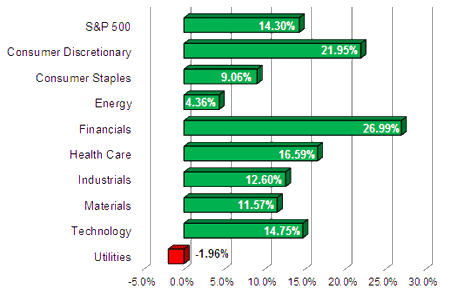
Market Commentary by Scott J. Brown, Ph.D., Chief Economist
 Stock market participants were encouraged by progress (over the weekend) in fiscal cliff negotiations. However, the two sides remained far apart and discussions stalled on Tuesday. House Speaker Boehner proposed a plan B, which would raise taxes on those making more than $1 million per year. However, the plan faced opposition from Senate Democrats, a threat of a presidential veto, and rejection from some of the more conservative members of the House.
Stock market participants were encouraged by progress (over the weekend) in fiscal cliff negotiations. However, the two sides remained far apart and discussions stalled on Tuesday. House Speaker Boehner proposed a plan B, which would raise taxes on those making more than $1 million per year. However, the plan faced opposition from Senate Democrats, a threat of a presidential veto, and rejection from some of the more conservative members of the House.
Lacking enough votes within his own party, Boehner pulled the plan on Thursday evening. The result was an even greater bargaining advantage for the Democrats and a near certainty of going over the cliff. There’s still a strong belief that a deal will be reached in January or early February, but negotiations may have to start over with the new Congress. Post-cliff, however, Republicans would be able to vote for tax cuts rather than tax increases.
The economic data were mixed, but generally positive. Real GDP rose at a 3.1% annual rate in the 3rd estimate for 4Q12 (up from +2.6% in the 2nd estimate and +2.0% in the advance estimate). In November, personal income and spending more than recovered from the effects of Hurricane Sandy. Adjusted for inflation, consumer spending (70% of Gross Domestic Product) appeared to be on track for an annual rate of 2.0% to 2.5% in 4Q12. Durable goods orders rose more than expected, and the details of the report suggest that business fixed investment will make a positive contribution to GDP growth.Next week, the economic calendar thins out. Holiday weeks tend to be pretty dull for the markets, but thin volumes can sometimes exaggerate what would otherwise be minor moves. The economic figures bunch up on Thursday and Friday, but may be unlikely to have much of an impact on the markets. Investors may look ahead to 2013 with greater trepidation due to the fiscal cliff.
Indices
| Last | Last Week | YTD return % | |
| DJIA | 13311.72 | 13170.72 | 8.34% |
| NASDAQ | 3050.39 | 2992.16 | 16.71% |
| S&P 500 | 1443.69 | 1419.45 | 14.30% |
| MSCI EAFE | 1616.95 | 1583.77 | 16.04% |
| Russell 2000 | 852.49 | 824.20 | 14.43% |
Consumer Money Rates
| Last | 1-year ago | |
| Prime Rate | 3.25 | 3.25 |
| Fed Funds | 0.18 | 0.07 |
| 30-year mortgage | 3.32 | 3.91 |
Currencies
| Last | 1-year ago | |
| Dollars per British Pound | 1.628 | 1.567 |
| Dollars per Euro | 1.324 | 1.309 |
| Japanese Yen per Dollar | 84.320 | 77.790 |
| Canadian Dollars per Dollar | 0.988 | 1.029 |
| Mexican Peso per Dollar | 12.768 | 13.799 |
Commodities
| Last | 1-year ago | |
| Crude Oil | 89.68 | 97.22 |
| Gold | 1642.08 | 1615.63 |
Bond Rates
| Last | 1-month ago | |
| 2-year treasury | 0.26 | 0.27 |
| 10-year treasury | 1.75 | 1.69 |
| 10-year municipal (TEY) | 3.03 | 2.71 |
Treasury Yield Curve – 12/21/2012
S&P Sector Performance (YTD) – 12/21/2012
Economic Calendar
| December 24th |
— |
Christmas Eve (markets close early) |
| December 25th |
— |
Christmas Holiday (markets closed) |
| December 27th |
— |
Jobless Claims (week ending December 23rd) New Home Sales (November) Consumer Confidence (December) |
| December 28th |
— |
Chicago Purchasing Managers Index (December) Pending Home Sales Index (November) |
| December 31st |
— |
New Year’s Eve (bond market closes early) |
| January 1st |
— |
New Year’s Holiday (markets closed) |
| January 2nd |
— |
ISM Manufacturing Index (December) |
| January 3rd |
— |
ADP Payroll Estimate (December) FOMC Minutes (December 11th-12th) Motor Vehicle Sales (December) |
| January 4th |
— |
Employment Report (December) |
| January 21st |
— |
MLK, Jr. Holiday (markets closed) |
| January 30th |
— |
FOMC Policy Decision (no Bernanke press briefing) |
Important Disclosures
US government bonds and treasury bills are guaranteed by the US government and, if held to maturity, offer a fixed rate of return and guaranteed principal value. US government bonds are issued and guaranteed as to the timely payment of principal and interest by the federal government. Treasury bills are certificates reflecting short-term (less than one year) obligations of the US government.
Commodities trading is generally considered speculative because of the significant potential for investment loss. Markets for commodities are likely to be volatile and there may be sharp price fluctuations even during periods when prices overall are rising. Specific sector investing can be subject to different and greater risks than more diversified investments.
Tax Equiv Muni yields (TEY) assume a 35% tax rate on triple-A rated, tax-exempt insured revenue bonds.
![]() Material prepared by Raymond James for use by its financial advisors.
Material prepared by Raymond James for use by its financial advisors.
The information contained herein has been obtained from sources considered reliable, but we do not guarantee that the foregoing material is accurate or complete. Data source: Bloomberg, as of close of business December 13th, 2012.
©2012 Raymond James Financial Services, Inc. member FINRA / SIPC.




